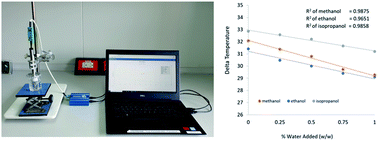Non-destructive measurement technique for water content in organic solvents based on a thermal approach
Abstract
The water content of organic solvents is one of the crucial properties that affect the quality of the products and the efficiency of the manufacturing processes. The established water determination methods such as Karl Fischer titration and gas chromatography require skilled operators, specific reagents, and prolonged measurement time. Thus, they are not suitable for both on-line and in-line applications. In this study, we aim to develop a real-time and low-cost device with reliable accuracy. The proposed device based on a newly developed thermal approach could non-destructively detect the water content in multiple organic solvents at low concentrations with high accuracy and without the use of any specific reagent. Experiments were performed for the determination of water content in organic solvents such as methanol, ethanol, and isopropanol. The results show that the proposed device is feasible for the water content determination in methanol, ethanol, and isopropanol at 0–1% w/w. A Bland–Altman plot to illustrate the differences in measurements between the proposed device and coulometric Karl Fischer titration shows that most of the measurements lie within the limits of agreement where 95% of the differences between the two methods are expected to fall in the range of −0.13% and 0.09%.



 Please wait while we load your content...
Please wait while we load your content...